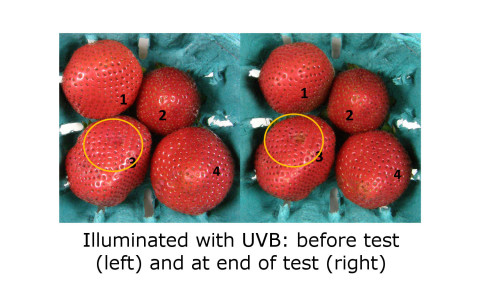WASHINGTON--(BUSINESS WIRE)--Strawberry lovers rejoice: the days of unpacking your luscious berries from the refrigerator only to find them sprouting wispy goatees of mold may be numbered. A research team from the U.S. Department of Agriculture's (USDA) Food Components and Health Laboratory in Beltsville, Md., and Sensor Electronic Technology, Inc. (SETi) in Columbia, S.C., has demonstrated that low irradiance ultra-violet (UV) light directed at strawberries over long exposure periods at low temperature and very high humidity—typical home refrigerator conditions—delays spoilage. The team used a novel device incorporating light-emitting diodes (LEDs) that emit UV at wavelengths found in sunlight transmitted through Earth’s atmosphere. The results, which will be presented next week at the Conference on Lasers and Electro-Optics (CLEO: 2013), are significant because previous attempts using traditional UV light sources for storage of produce resulted in severe drying, and it was unknown if the advantages of long exposure to low-level UV light would be effective against rot.
LEDs are now commonplace thanks to their long life and energy efficiency, as well as their ability to span the wavelength range from near UV to infrared. The full UV spectrum, however, had presented challenges for LED manufacturers – until recently. SETi developed a special technology to fabricate UV LEDs across the entire UV spectrum from UVA to UVC. This flexibility allowed them to tune the emitted light to the wavelengths most effective for this application.
“UV-LEDs presented the opportunity to try low power devices that work well in the cold and can be engineered to work in small spaces such as refrigerator compartments,” says lead USDA researcher Steven Britz, who will present the work at CLEO: 2013.
Using strawberries purchased from a local supermarket, Britz’s team placed one batch in a dark refrigerator and one batch in a refrigerator exposed to UV-LEDs. Results showed the UV-treated berries had their shelf life extended twofold—nine days mold-free—over darkened berries, as judged by weight, moisture content, concentration of select phytochemicals, visible damage, and mold growth.
Based on these encouraging results, the team is working to commercialize the technology for home refrigerators.
“These findings are expected to have a major impact on the appliance business to extend the shelf life and preserve nutritional value of fresh produce while reducing waste and saving money for every household,” states Remis Gaska, president and CEO of SETi.
CLEO: 2013 presentation ATh3N.3. “Deep Ultraviolet (DUV) Light-Emitting Diodes (LEDs) to Maintain Freshness and Phytochemical Composition During Postharvest Storage” by Stephen Britz will take place Thursday, June 13 at 2:45 p.m. in the San Jose Convention Center.
About CLEO
With a distinguished history as the industry's leading event on laser science, the Conference on Lasers and Electro-Optics (CLEO) is where laser technology was first introduced. CLEO unites the field of lasers and electro-optics by bringing together all aspects of laser technology, with content stemming from basic research to industry application. CLEO: Expo showcases the latest products and applications from more than 300 participating companies from around the world, providing hands-on demonstrations of the latest market innovations and applications. The Expo also offers valuable on-floor programming, including Market Focus and the Technology Transfer program.
Sponsored by the American Physical Society's (APS) Laser Science Division, IEEE Photonics Society and the Optical Society (OSA), CLEO provides the full range of critical developments in the field, showcasing the most significant milestones from laboratory to marketplace. With an unparalleled breadth and depth of coverage, CLEO connects all of the critical vertical markets in lasers and electro-optics. For more information, visit the conference's website at www.cleoconference.org. CLEO: 2013 takes place June 9 – 14 in San Jose, Calif.
About Sensor Electronic Technology, Inc. (SETi)
SETi is the global leader in UV LED technology that spans the wavelength range from 240nm to 360nm. With brands UVTOP® and UVClean®, SETi supplies the most comprehensive suite of UV LED products including LEDs, LED lamps and light sources and complete LED solutions. SETi is fully vertically integrated, and designs, develops and manufactures is products in accordance to ISO9001 and AS9100 standards at its facility in Columbia, South Carolina. For more information, please visit www.s-et.com or contact us at info@s-et.com or on 1-803-647-9757.

